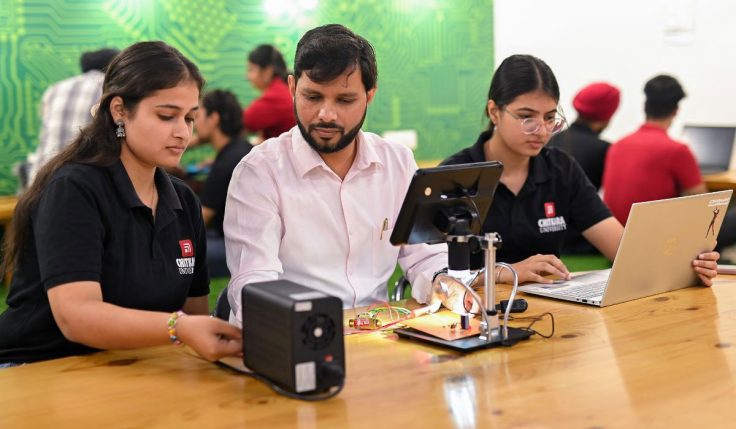Electrical Engineering is a beacon of creativity and advancement in the ever-changing face of technology. Understanding the future of Electrical Engineering is not just useful; it is crucial as we go ahead into an era marked by disruptive developments. This comprehensive investigation digs into the intricate regions of this subject, putting light on the most recent trends, ground-breaking inventions, and the significant influence they are destined to make. This extensive book provides essential insights for students considering a career in Electrical Engineering, putting them at the forefront of this exciting sector.
Smart Grids and Sustainable Energy: Smart grids represent a paradigm shift in energy generation, distribution, and consumption. Smart grids improve efficiency, reduce losses, and seamlessly incorporate renewable energy sources by using modern sensors, communication networks, and data analytics. According to MarketsandMarkets, the worldwide smart grid industry will be worth $61.3 billion by 2023. Electrical engineers specialized in grid modernization and sustainable energy solutions are critical to guarantee a stable and environmentally friendly power supply in the future.
Internet of Things (IoT) and Automation: IoT device proliferation continues to impact industries ranging from healthcare and manufacturing to transportation and agriculture. Electrical engineers are critical in IoT because they enable gadgets to connect, gather data, and act autonomously. Automation, enabled by IoT technology, optimizes processes, decreases human involvement, and increases efficiency. According to IDC, worldwide IoT investment will exceed $1.1 trillion by 2025. Electrical engineering graduates who are skilled in IoT applications are well-equipped to provide creative solutions that will propel the fourth industrial revolution.
Artificial Intelligence (AI) and Machine Learning Integration: The incorporation of AI and Machine Learning algorithms into Electrical Engineering has heralded the arrival of a new age of intelligent systems. Engineers use artificial intelligence to manage power systems, forecast equipment faults, and improve energy efficiency. Machine Learning algorithms process massive information, allowing for predictive maintenance and real-time decision-making. AI is anticipated to contribute $15.7 trillion to the global economy by 2030, according to PwC. Electrical engineers who are knowledgeable about AI applications are at the forefront of building self-learning systems, impacting the future of automation and problem-solving.
Electrification of Transportation: Transportation electrification is a critical step in mitigating climate change and ensuring a sustainable future. Electric cars (EVs) are growing more popular, fueling demand for charging infrastructure and cutting-edge battery technologies. Power electronics and energy storage system electrical engineers are critical in this transformation. According to Fortune Business Insights, the worldwide electric vehicle industry will be worth $802.81 billion by 2027. Electrical engineers are perfectly positioned to change the automobile sector by promoting improvements in EV technology and infrastructure.
Read this blog post: The Role of Electrical Engineering in the Development of Smart Cities
Students who choose a career in Electrical Engineering are not only embracing a field; they are embracing the future. The trajectory of Electrical Engineering is defined by the complicated fusion of sustainable energy, IoT applications, AI integration, and transportation electrification. Students who pursue a B.E. in Electrical Engineering will be equipped with the information, skills, and vision required to traverse this shifting world. Electrical engineers, as protectors of innovation and forerunners of development, are building a future where technology meets sustainability and possibilities are endless.
Chitkara University’s B.E. in Electrical Engineering stands at the forefront of innovation, offering a transformative educational experience that empowers students to pioneer the future of Electrical Engineering. This comprehensive 4-year program is not just an academic pursuit; it’s an immersion into cutting-edge technologies, hands-on practical experience, and industry-aligned specializations. The curriculum doesn’t just educate; it prepares students to harness the power of electricity, build advanced electronic systems, and solve complex challenges faced by the modern world.
At the core of this program is a curriculum meticulously designed to bridge theoretical knowledge with practical application. Students delve into the realms of electrical systems, instrumentation, control systems, and green technologies, acquiring skills that meet industry standards. A unique feature is the option to specialize in Industrial Automation, a critical area in the industry. Furthermore, students can pursue a Minor in Computer Science Engineering, gaining coding expertise and widening their career horizons. The program integrates real-world exposure through internships with blue-chip corporations, ensuring graduates are industry-ready. Armed with in-depth knowledge and specialized skills, graduates can explore diverse roles, from Micro Electrical Engineers to Power Engineers, in both public and private sectors.
Chitkara University’s B.E. in Electrical Engineering is more than an academic degree; it’s a transformative journey for aspiring innovators. With industry-integrated learning, innovative specializations, and hands-on experience, students are prepared to lead in a world driven by electricity and technology. By joining this program, students not only become Electrical Engineers but also embark on a career path where they shape the future of technology, sustainability, and innovation. Chitkara University paves the way for students to excel, ensuring they are equipped with the skills and expertise to make a lasting impact in the field of Electrical Engineering.






